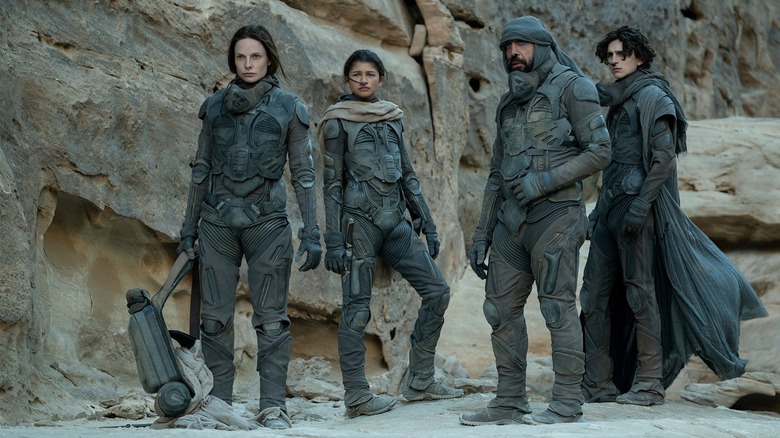
The first thing you notice when talking to "Dune" editor Joe Walker over Zoom is, he has a beautiful bookshelf. It's full of art books and, because he trained as a classical composer, music books. A valuable tip he picked up from production designer friend: organize the books based on color, not alphabetical order. It's more visually appealing, especially to Walker's keen eye, which has helped create films from Steve McQueen and Denis Villeneuve over the years. In other words, some of the most exciting cinema of the 21st century.
"Dune" is no exception. Similar to "Blade Run 2049," it's an epic that moves with an almost dreamlike quality. With Part One of the Frank Herbert adaptation, Walker, Villeneuve, and everyone involved crafted an otherworldly vision. After making small talk about music and Charles Burns' "Black Hole," which Walker is reading and loving at the moment, the editor walked us through his experience editing "Dune."
"That's The Key To The Editing Of It, The Fascinating Rhythm Of It."
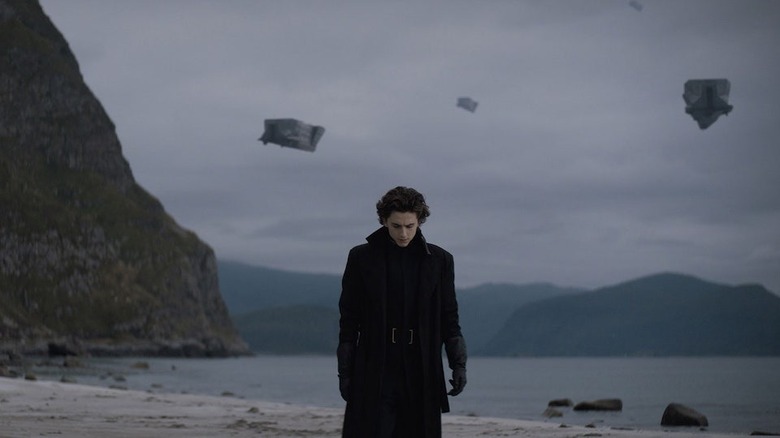
You trained early on as a musician. How do your instincts for music, especially your handle on pacing and rhythm, help in an editing room?
It's been my ambition to bring musicality into editing. I always respect it when I see it in others. It is a hard thing to define because the rhythm isn't necessarily an auditory thing. It's a combination of many departments, the work of many departments. There's the rhythm of a shot itself, of the composition, and then there's the rhythm of the speed of that shot. Then there is a rhythm of the performance within it. And then, there's the sound effect that goes with it. And then Hans' music that is on top of it. I have tentacles going out into all these wonderful departments and together we're building a rhythm. With this team on "Dune," we're all very well-rehearsed. We have worked together a lot. I mean, my first collaboration with Hans Zimmer was in 1988 when I was a mere pup.
What did you both make together in 1988?
It was an amazing television series on the BBC, called "First Born." Charles Dance played a religious scientist, a scientist who happened to be Catholic. And he's conducting an experiment to create a hybrid human gorilla. It sounds terribly silly, but actually, Hans wrote the most amazing score, which elevated it. I remember also the director talking about how Hans talked about music in a way that is very filmmaker-friendly, because you may not understand that what you want is a chord modulation, or you want something to sound like a chorale. People don't tend to know those words, but he has a way of relating all of that to filmmaking.
It's a long collaboration and we're very aware of each other's rhythms. In a funny way, I kind of hear or feel a rhythm sometimes that I'm responding to underlining some scenes that I cut. I can't express it. I'm always hoping that the music is going to pick it up, and it always excels that expectation by so far.
I'll just be very specific and say, for example, there's a scene with the first time you encounter the sand worm, which is a scene where Paul Atreides goes out with Duke Leto and Liet-Kynes. They go out into the desert and they see a spice harvester being attacked by a worm. I cut that without music, totally without music. And then we built up the sound effects. And then at some point our amazing music editors came along and they did the fantastic job of pounding drums that helped define where the major beats and turning points of the scene would be, musically. And then Hans went and wrote it completely differently. He wrote it as an encounter with God. It's something beautiful and spiritual and totally in counterpoint to the action, which is taken care of by what we see and what we hear in terms of sound effects.
I'm just saying, I'm happy trying to find a very musical, very rhythmic cut. I think "Dune" is super rhythmic. I mean, that's the key to the editing of it, the fascinating rhythm of it.
There's such a graceful, hypnotic effect to the movies you and Denis have done. How do you both achieve that effect?
First of all, Denis is really into editing. I think that's clear, and he takes it very seriously. We spend a lot of time trying things out and sometimes to do with clarity and economy, storytelling, momentum, being able to pick up a small detail, especially in this epic story to celebrate the tiny moments, intimate moments, whether that's a hand on a neck, whether it's a beetle crawling on a hand, and setting those up, so that they payoff later. Certainly, there's a rhythm to those images. I always feel that, although his films have great dialogue and great action sequences, of course, they also thrive with what I describe as a very brain stem-y approach.
There are images where you don't need to see everybody's face. You can just see the hand on the back of the neck and you get the context that it's a woman who's abandoning her life on a planet in the face of peril, while the servants are in the background and everything about the history of this family has been packed away in crates and shipped. At this moment of tremendous anxiety, this reassuring hand comes in and you can see from the expression, the level of trust between these two people. I mean, how do you write that? It's a brain stem-y image. I think it's one of many in this film that resonate because they're very sensory and very immersive. As an editor, I'm always trying to make sure of the platform for that, so that you can really appreciate that.
"My Thing Is, I'm Trying To Keep Out The Waste. I Don't Want To Be Showy."
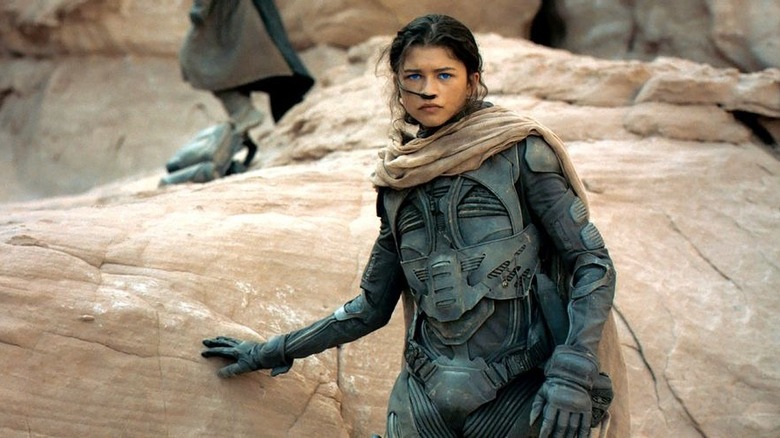
When you first started cutting the movie together, how did you and Denis experiment?
There are a lot of things we could talk about there. I mean, the thing that we took probably the longest amount of time to figure out was the dream visions and Paul's inner life, which is so crucial to an understanding of where he is, what he faces and the pressures on him. Denis always said that they would be more like documentary editing. We have the ingredients, but we didn't know quite where and how. It ended late in the schedule. I think it was literally the day before I had to send the drive back that we finessed the last one.
Those are a combination of many things, there are combinations of images, but also sound design and things like flares. I had hours of beautiful camera flares that they'd shot. A very unique-looking camera flare that reminds me in some way of when you're looking through your eyelashes in summertime, that daydream-y quality, and that became a little device to be able to get away from continuity in the cut sometimes and to move in a dreamlike fashion through the process.
In narrative terms, we're also trying to experiment to try and find a way of expressing that this skill that Paul has is new to him, much like the Voice, that took a lot of refinement to be able to tell the story. The first time you hear him say the Voice, it's out of sync. And then you hear these little witch voices later when you see Charlotte Rampling, the Reverend Mother, do it. It's a gut punch it's so powerful. And within 24th of a second, he's kneeling at her feet where she wants him.
Some things you get straightaway. Surprisingly, the fight sequences didn't change really since the day after they shot it. Denis, thankfully, isn't somebody who worries about things that are already working. We concentrate on what we need to get right.
It's a weighty movie, but again, it moves elegantly. With a story and vision this dense, how did you not break the camel's back?
I really appreciate that. My thing is, I'm trying to keep out the waste. I don't want to be showy. For you to feel my hand guiding you through this thing, I don't like that sense of being manipulated as an audience member anyway, but sometimes, it's giving space to things. So that we're not talking too abstractly, there is the scene where Stilgar arrives and has his first political meeting with Duke Leto and Duncan Idaho, and they're accompanied by Stephen McKinley Henderson, who's playing Thufir, and Paul Atreides played by Timothée. Josh Brolin is there as well. He's amazing.
It's quite a rock group, that bunch of actors, to be honest. Every single one of them is firing something interesting off. Each of them, you could honestly play the entire scene on Stephen McKinley Henderson, his face is an absolute picture of what the temperature of every moment is. I did use quite a lot of his reactions, which I find beautiful and again, very rhythmic. But in that scene, when Stilgar walks in, he looks at them, he walks past numerous guards, and he goes up to the table, waits and sizes them up. Eventually, after a pause, he spits on the table and everybody goes to attack him.
The rhythm of that was important to me that I didn't want to break that shot. I don't cut away. There are loads of good reasons to go, "You could have cut that differently. You could have cut it to Paul, looking at him and appreciating Stilgar." There's some sense of mutual recognition there. You could look at Thufir Hawat for his anxiety that this meeting did not start well. There are a dozen reasons why you might go to another actor for that moment, but I'd just like not to get in the way of the performance, which I thought was superb. Denis, obviously, celebrated that, too. So, that's why it's cut that way. I think the result is you don't necessarily feel the edit. I like to keep out of the way and gain momentum without interfering.
"I Think I Squeezed Every Frame Out Of That."
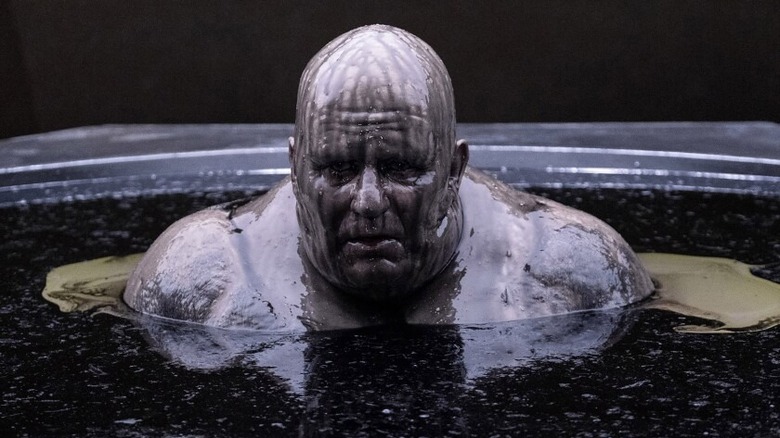
How about when we first see the Baron rise into frame?
I mean, wow. I was delighted in those moments where we'd hold long before he rises. I liked how Rabban is there talking to an empty room. And then after a long period, you hear this awful sluicing noise. Some horrible black oil and then slowly, he surfaces. I think I squeezed every frame out of that. I don't have to do very much to make Baron Harkonnen impressive. I think there were some choices that we could make sometimes to do with, for example, the way that we show him float, which is really nice, I think the way it is at the moment. There were lots of options.
For example, to show how he moves from one end of the room with a suspense belt, it is delicious. I liked the choices Denis made in the edit, which was to feel a lightness, of him floating past and that he's wearing some long flowing robe that scrapes the edge of the chair, where Leto awaits his fate. It's delicious. It's going in the opposite directions sometimes of what you might expect.
How did you find yourself responding to the Fremen? How did their culture and style of combat shape the rhythm?
I think the most important thing is to set them up really well with the books. They set up the idea of the Fremen very early, and we had that battle scene at the beginning where you see the culture in some small way at the beginning, and you're seeing it also because it's through a tourist guide. I don't know if you know, but I am the voice of the film for some reason. At first, it was a temp track.
Really?
Yeah. I'm Denis' go-to for the voice of British imperialism, I think [Laughs].
[Laughs] Well done.
Thank you. We took great delight in, for example, "they are dangerous and unreliable." I thought it was gloriously brief and dismissive. There's a lot of detail in that. I mean, mostly the detail is all Denis on set, I think, and the amazing casting of those people and the skills and the way they sit and the way they move. It is phenomenal. We took advantage of that moment towards the end of the film where they reached the Fremen and if Paul hears a stone or a pebble, it's because they wanted him to hear that. They were already in position. They can move silently and they're expert tribal killers. They fight like demons, as Duncan Idaho puts it.
How much did you and Denis discuss how long it should take to get Paul to Arrakis?
Oh, it took a long time to figure that out. There's a real paradox, Jack, that I've discovered, which is sometimes shorter doesn't necessarily feel shorter. Shorter duration doesn't necessarily mean that the flow of the film improves. Sometimes, but I think the more important thing is what's compelling, and that's the imperative in storytelling terms. We take our time to set the family up so that you really understand, and you really feel for the people who are involved and you're aware of the dark forces without it hopefully being rammed down your throat.
"It Was Such A Stepping Stone On A Much Longer Path."
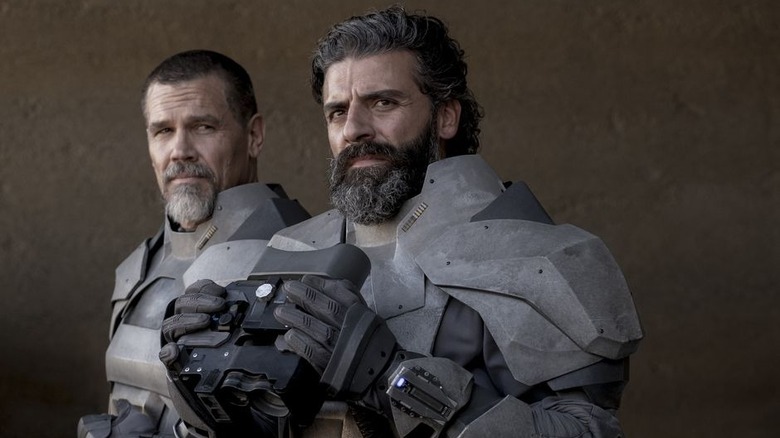
Was the ending always exactly where you and Denis wanted to end Part One?
Yes. There's been a lot of speculation that more was filmed or Part Two was partly filmed, but it wasn't. I can just say it wasn't. We have yet to film Part Two, which I'm glad to say today, I heard that we are going to do it. I told Denis I'd already packed my parasol [Laughs]. Eric Roth and Denis, when they set out to figure this film out, I think Denis' early stipulation was that it should be divided in two. I think Eric Roth was the first of the writers to crack the safe, if you like, and found a good way to divide it. It's difficult, isn't it? It's a very long novel, and trying to squeeze it into a shorter film would be pointless and dangerous.
Even a couple of chapters from the book could be a movie.
Yeah. It's fascinating the way the book's written. It's got this very charming way of being inside everybody's head. It's funny, because it's not cinematic. Cinema is so much more about seeing people do things and the action and simplicity, economy. I mean, you wouldn't necessarily introduce a gun in act one, not to see it used in act three, but we have that. It's part and parcel of setting up the Fremen culture. It's not the gun, but it's a crysknife. You set it up quite early. But that specific crysknife, we never see again. I don't think that's a flaw in the film or the book. I think it's just the nature of the differences between novels and films.
How'd the assembly cut turn out? What was your first impression of it?
It was such a stepping stone on a much longer path. Somebody once said, "Your film is never as promising as your dailies, and never as disappointing as your first assembly." I hope I'm not paraphrasing, but the first assembly was full of all sorts of junk that I need as an editor to put time into the equation of some of those sequences. For example, the hunter seeker scene literally had text, the words, "hunter seeker," moving through frame slowly and coming towards you in perspective. I did it too long. To anybody, if it had been a first-time director, our first time working together, I'm sure I would've got fired, but Denis knows that I have to build things up.
It's a placeholder to say, "No, this is really creepy if it moves slowly." With Denis, I worked out the timing of those things. I could do that by moving faster or slower before you then go to the VFX team and go through the expensive process of doing it for real, and putting the three-dimensional object in place.
The first assembly is full of awkward, gawky moments like that, which maybe run too long, maybe in the wrong order. I don't even remember how long it was, but I don't think it was substantially over length. It was sort of a tight-ish cut, but it was like, "Let's just see that and get a feeling from it," to how this general feeling of the story works and then let's get stuck in, which we spent a much longer time doing than watching the first assembly.
"Is This The Best Way To Tell The Story?"
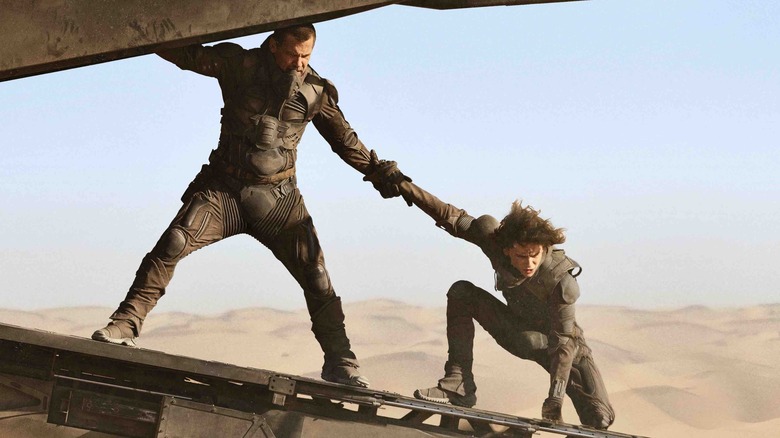
With the delays, did you have more time in the editing room?
We kept to the schedule, but the schedule did change. I think we were just at the end of director's cut and the pandemic hit. We were due to get the film ready for December, so that would have given us four or five months, I think. Everything stopped and we all went and moved into garden sheds and spare bedrooms around the Los Angeles area. Denis was in Montreal for several months and we were working through software, but there was a long period where nothing was happening. We were waiting to find out what was going to happen.
I don't want to talk about the pandemic in such terms, because it's created such a disaster for everybody. In my personal experience, it was a great benefit to the film and to me. To me, because there are times when you're worried about something that isn't working and you lie awake at night going, "Oh God," all this anxiety about trying to get this thing figured out. What do you do? Do you lie in bed awake? Or do you go downstairs in the middle of the night, turn the Avid on and fix it for half an hour and then you go back and sleep?
I rested better by having instant access to it. I have to say, the tempo of the edit slowed down, too, while we were waiting for the effects. I can't remember quite what happened with them, but we kept carrying on, kept going. And then when we picked up again, it was the full rush to get things ready. We didn't have the luxury of that on "Blade Runner 2049" at all. On this one, we had the chance to actually put it away for a little while and then re-engage and say, "Is this the best way to tell the story?"
Which scenes kept you up at night?
All the time, all the time. For example, figuring out those little flashes inside in the famous Gom Jabbar scene, it was a freeform kind of cutting. I wasn't happy until I was happy. This is the scene where Paul Atreides is tested by the Bene Gesserit to see whether he has self-control. He has to put his hand in a box that induces pain. If he takes his hand out, he'll die by a needle covered in poison. It's weirdly tense, given that everybody's static and there's no movement. One person's kneeling, one person's sitting, and the other person's outside the door. For me, how much tension can you get in the scene?
Denis is really good at this. The scene on the bridge in "Sicario" is pretty much the same thing. Everyone is in position. It's basically a chase sequence with parked cars. With the Gom Jabbar scene, that was quite editing intensive, trying to get the beats you need. It was one of the first things they shot and some of the most remarkable footage that I received in the first week of any shoot. Seeing Timothée's performance and seeing his eyes change when something rises up inside him, the original cuts in the first assembly of that had no inner visions. He didn't come away with anything. It was just shots of the three people and the box. Then we develop that inner vision stuff.
And then, that goes all the way through to all departments because the sound team were giving me these synaptic sounds and music. At one point, dear Hans sent us a suite. In the middle of the suite was this incredible singer, Loire Cotler, who's a New York-based singer I highly recommend you listen to. She had recorded this kind of whale. We heard it and we put it into the cut. It blended so well, and that was the lovely thing about the collaboration. We showed that to Hans and his team the next day. We were all dancing. We found something together that bonded and told the story well.
"Dune" is now playing in theaters and on HBO Max.
Read this next: 12 Awesome Sci-Fi Movies That Never Got Sequels
The post Dune Editor Joe Walker on Finding the Rhythms in Editing, Narrating the Sand Walk Guide [Interview] appeared first on /Film.
0 Comments